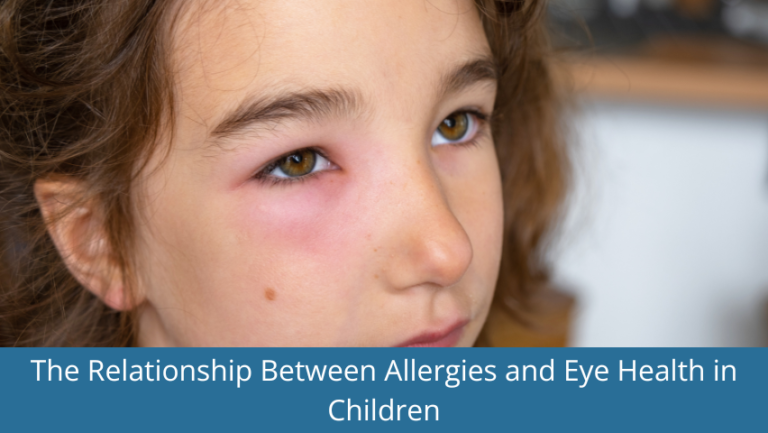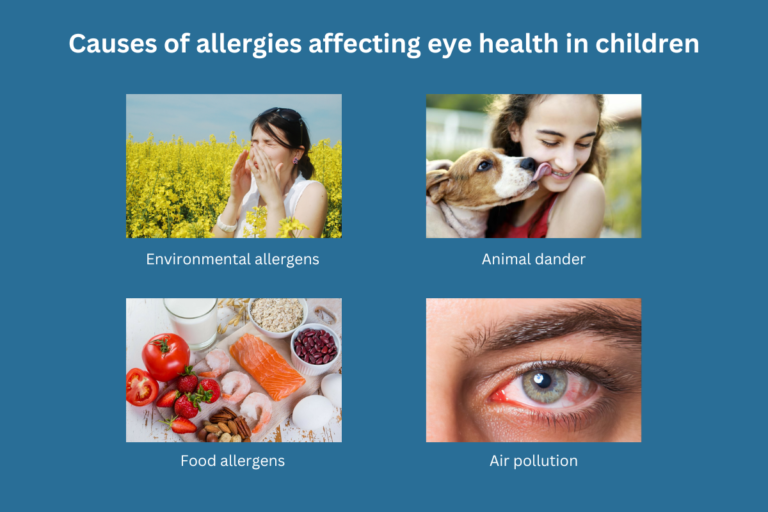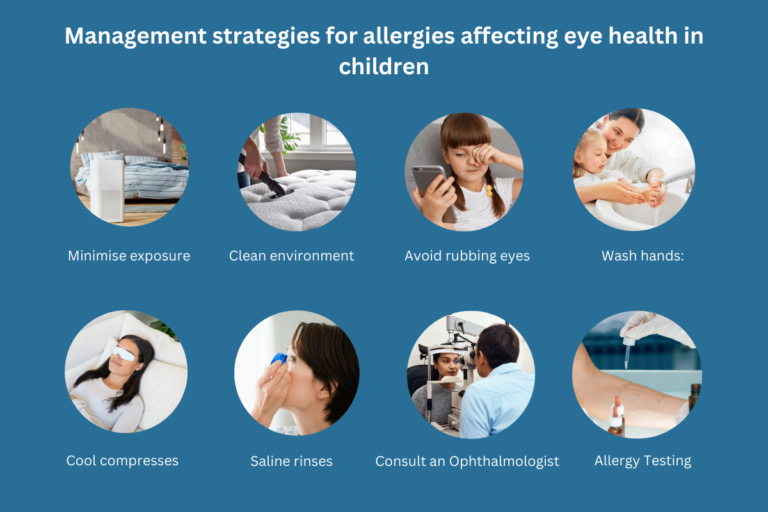Table of Contents
ToggleThe Relationship Between Allergies and Eye Health in Children

Allergies are a prevalent concern among children and can significantly impact their quality of life. While many people are familiar with symptoms like sneezing, runny nose, and itchy skin, the effect of allergies on eye health is often less discussed. In this blog, we will explore how allergies influence eye health in children, including symptoms, causes, treatments, management strategies, potential complications, and the importance of accurate diagnosis.
1. Symptoms of Allergies Affecting Eye Health in Children
Allergies can cause several eye-related symptoms in children:
- Allergic Conjunctivitis: This condition is characterised by redness in the white part of the eye, itching and burning sensations, swelling of the eyelids, and increased tear production.
- Itchy and Watery Eyes: Children may experience excessive tearing and persistent itching, which can interfere with daily activities and cause discomfort.
- Dark Circles: itchy eyes and eye rubbing can lead to dark circles under the eyes, known as “allergic shiners”, giving the appearance of fatigue or discomfort.
- Other Symptoms: In more severe cases, children might also experience sensitivity to light and blurred vision.
2. Causes of Allergies Affecting Eye Health in Children
Various factors can trigger allergic reactions that affect eye health:

- Environmental Allergens: Pollens from trees, grasses, and weeds; dust mites commonly found in household dust and bedding; and mould from damp or humid areas.
- Animal Dander: Skin flakes and saliva from pets such as cats and dogs can trigger allergies.
- Food Allergens: Certain foods may cause allergic reactions that affect the eyes.
- Air Pollution: Pollutants and irritants in the air can worsen eye allergies.
3. Potential Complications of Allergies on Eye Health
If allergic reactions are not managed properly, they can lead to more severe complications:
- Chronic Conjunctivitis: Persistent inflammation can cause ongoing discomfort and may lead to complications such as infection or vision problems if not addressed.
- Corneal Damage: Frequent rubbing of itchy eyes, a common response in children with allergic reactions, can cause damage to the cornea (the clear front surface of the eye).
- Blepharitis: Inflammation of the eyelid margins, which can be exacerbated by allergies, leading to symptoms such as redness, swelling, and crusting of the eyelids.
4. Diagnosing Allergies and Eye Health Issues
Accurate diagnosis is crucial for effective treatment. At Clarity Eye Surgeons, our ophthalmologists conduct a detailed examination of your child’s eyes to check for signs of inflammation, irritation, and any potential complications. This examination helps us understand the extent of the impact of allergies on your child’s eye health.
5. Treatments for Allergies Affecting Eye Health in Children
Effective treatments for managing eye allergies include:
- Allergen avoidance: This is often the most important, but can be challenging to implement practically. An allergy specialist can provide more specific advice.
- Cool Compresses: Applying a cool, damp cloth to the eyes can soothe irritation and reduce swelling.
- Medications:
- Antihistamines: These can be oral or topical, helping to reduce itching and redness.
- Decongestant Eye Drops: These can relieve redness and swelling but should be used under medical supervision.
- Corticosteroid Eye Drops: For severe inflammation only, and prescribed by an eye doctor “under close monitoring”.
- Antihistamines: These can be oral or topical, helping to reduce itching and redness.
- Allergy Shots (Immunotherapy): This treatment involves gradual exposure to allergens to build tolerance and is suitable for long-term management. An allergy specialist can provide more specific advice.
- Prescription Eye Ointments: For severe cases, these can help reduce inflammation and itching.
6. Management Strategies for Allergies Affecting Eye Health in Children
Managing eye allergies involves a combination of preventive measures and ongoing care:

Avoidance of Allergens:
- Minimise Exposure: Keep windows closed during high pollen seasons, and use air purifiers in the home.
- Clean Environment: Regularly washing bedding, carpets, and pet areas to reduce dust mites and dander.
Good Hygiene Practices:
- Avoid Rubbing Eyes: Encourage your child to avoid rubbing their eyes to prevent further irritation and complications.
- Wash Hands: Regular hand washing to reduce the risk of transferring allergens to the eyes.
Home Remedies:
- Cool Compresses: Applying cool compresses can alleviate itching and swelling.
- Saline Rinses: Use saline solutions to flush allergens from the eyes.
Regular Check-ups:
- Consult an Ophthalmologist: Regular eye examinations can help monitor and manage symptoms effectively.
- Allergy Testing: Identifying specific allergens can help in better managing exposure and treatment.
How do allergies affect vision development in children?
In some cases, untreated allergic reactions affecting the eyes can interfere with the normal development of vision in children. Key concerns include:
- Refractive errors: Chronic eye irritation or swelling may influence focusing abilities, leading to blurred vision or difficulty reading.
- Amblyopia (lazy eye): Severe or untreated allergic conjunctivitis could cause one eye to become dominant, potentially resulting in amblyopia.
- Strabismus: Persistent discomfort might lead to abnormal eye movements or misalignment.
Psychological and Social impact of eye allergies on children
Eye allergies do not just affect physical health but can also impact a child’s emotional well-being and social interactions:
- Classroom struggles: Itchy or watery eyes may make it harder for children to focus on studies or participate in activities.
- Social stigma: Visible redness, swelling, or dark circles might lead to embarrassment or bullying.
- Sleep disturbances: Discomfort may interfere with sleep, affecting overall behaviour and academic performance.
Conclusion
Understanding the relationship between allergies and eye health is essential for maintaining your child’s comfort and overall well-being. If your child is experiencing symptoms of eye allergies, seeking professional care is crucial to address both the cause and the resulting discomfort.
Author Bio
Dr Parth Shah is a director and principal ophthalmologist at Clarity Eye Surgeons in Canberra, with a special interest in paediatric ophthalmology. With extensive training and experience, he is renowned for his expertise in the field. Dr Shah is dedicated not only to performing successful surgeries but also to patient education. His compassionate approach, combined with technical proficiency, has earned him the trust and gratitude of countless patients. He is a true advocate for eye health and a trusted name in the Canberra ophthalmology community.
FAQs
While most eye allergies are manageable, untreated or severe cases can lead to complications such as chronic conjunctivitis and corneal damage which can affect vision. Regular monitoring and appropriate treatment can help prevent long-term damage.
Common allergens that frequently affect children’s eye health include pollen, dust mites, pet dander, and mould. Identifying and managing exposure to these allergens can help alleviate symptoms.
Allergies typically cause itching, redness, and watery eyes without fever or mucus discharge. Infections might present with additional symptoms like yellow or green discharge, pain, and swelling. Consulting an eye doctor can help determine the cause.
Yes, minimising exposure to known allergens, using air purifiers, keeping windows closed during high pollen seasons, and regularly cleaning your child’s environment can help reduce symptoms.
Ensure that your child follows their treatment plan, and inform school staff about their allergies. Providing allergy-friendly wipes, eye drops, or other necessary items can also help manage symptoms throughout the day.
If symptoms persist, it is important to follow up with your ophthalmologist. They may need to adjust the treatment plan or investigate other potential causes for the ongoing symptoms.
Regular eye exams are recommended to monitor symptoms and prevent complications. Typically, annual exams are sufficient, but more frequent visits may be needed if symptoms are severe or persistent.
While diet is not a primary factor in managing eye allergies, maintaining a balanced diet can support overall immune health. In some cases, specific food allergies may exacerbate eye symptoms, so it is important to identify and avoid those foods if necessary.
